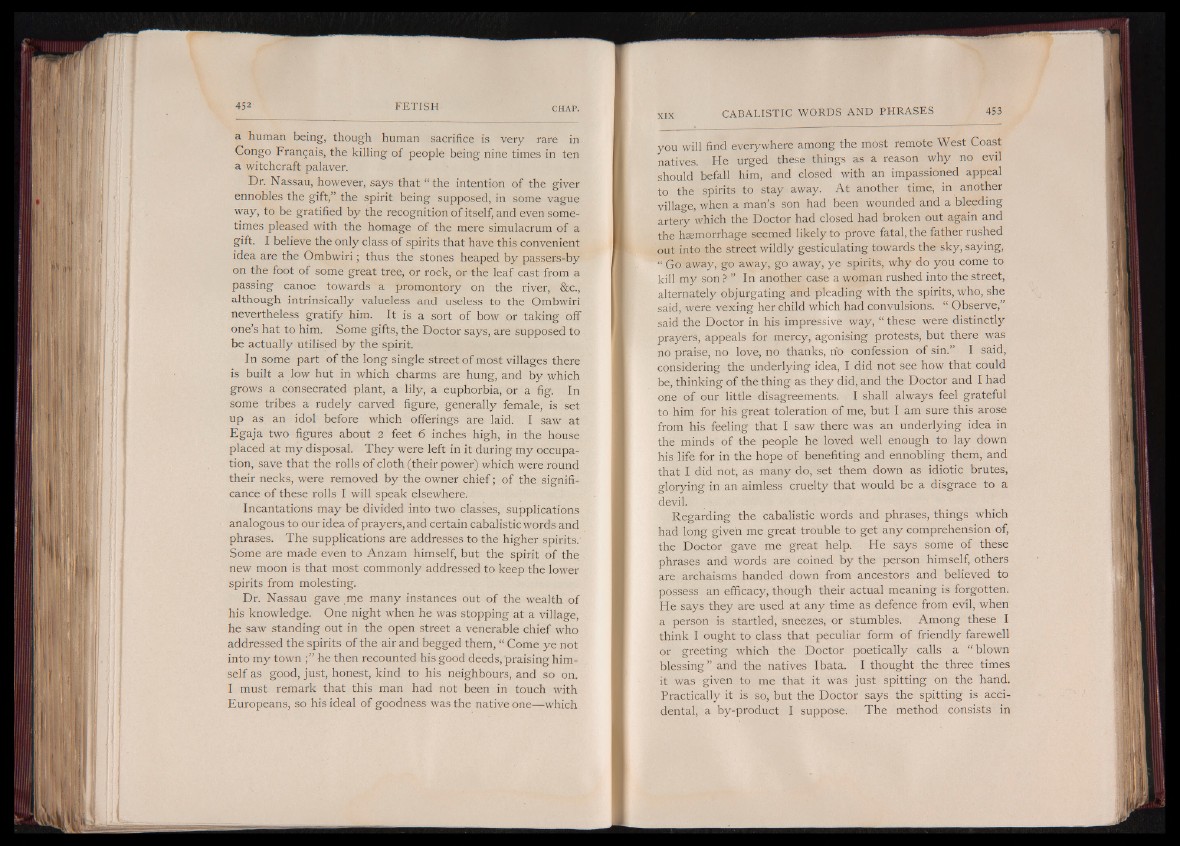
a human being, though human sacrifice is very rare in
Congo Français, the killing of people being nine times in ten
a witchcraft palaver.
Dr. Nassau, however, says that “ the intention of the giver
ennobles the gift,” the spirit being supposed, in some vague
way, to be gratified by the recognition of itself, and even sometimes
pleased with the homage of the mere simulacrum of a
gift. I believe the only class of spirits that have this convenient
idea are the Ombwiri ; thus the stones heaped by passers-by
on the foot of some great tree, or rock, or the leaf cast from a
passing canoe towards a promontory on the river, &c.,
although intrinsically valueless and useless to the Ombwiri
nevertheless gratify him. It is a sort of bow or taking off
one’s hat to him. Some gifts, the Doctor says, are supposed to
be actually utilised by the spirit.
In some part of the long single street of most villages there
is built a low hut in which charms are hung, and by which
grows a consecrated plant, a lily, a euphorbia, or a fig. In
some tribes a rudely carved figure, generally female, is set
up as an idol before which offerings are laid. I saw at
Egaja two figures about 2 feet 6 inches high, in the house
placed at my disposal. They were left in it during my occupation,
save that the rolls of cloth (their power) which were round
their necks, were removed by the owner chief ; of the significance
of these rolls I will speak elsewhere.
Incantations may be divided into two classes, supplications
analogous to our idea of prayers, and certain cabalistic words and
phrases. The supplications are addresses to the higher spirits.
Some are made even to Anzam himself, but the spirit of the
new moon is that most commonly addressed to keep the lower
spirits from molesting.
Dr. Nassau gave me many instances out of the wealth of
his knowledge. One night when he was stopping at a village,
he saw standing out in the open street a venerable chief who
addressed the spirits of the air and begged them, “ Come ye not
into my town he then recounted his good deeds, praising himself
as good, just, honest, kind to his neighbours, and so on.
I must remark that this man had not been in touch with
Europeans, so his ideal of goodness was the native one— which
you will find everywhere among the most remote West Coast
natives. He urged these things as a reason why no evil
should befall him, and closed with an impassioned appeal
to the spirits to stay away. At another time, in another
village, when a man’s son had been wounded and a bleeding
artery which the Doctor had closed had broken out again and
the hsemorrhage seemed likely to prove fatal, the father rushed
out into the street wildly gesticulating towards the sky, saying,
“ Go away, go away, go away, ye spirits, why do you come to
kill my son ? ” In another case a woman rushed into the street,
alternately objurgating and pleading with the spirits, who, she
said, were vexing her child which had convulsions. “ Observe,”
said the Doctor in his impressive way, “ these were distinctly
prayers, appeals for mercy, agonising protests, but there was
no praise, no love, no thanks, no confession of sin.” I said,
considering the underlying idea, I did not see how that could
be, thinking of the thing as they did, and the Doctor and I had
one of our little disagreements. I shall always feel grateful
to him for his great toleration of me, but I am sure this arose
from his feeling that I saw there was an underlying idea in
the minds of the people he loved well enough to lay down
his life for in the hope of benefiting and ennobling them, and
that I did not, as many do, set them down as idiotic brutes,
glorying in an aimless cruelty that would be a disgrace to a
devil.
Regarding the cabalistic words and phrases, things which
had long given me great trouble to get any comprehension of,
the Doctor gave me great help. He says some of these
phrases and words are coined by the person himself, others
are archaisms handed down from ancestors and believed to
possess an efficacy, though their actual meaning is forgotten.
He says they are used at any time as defence from evil, when
a person is startled, sneezes, or stumbles. Among these I
think I ought to class that peculiar form of friendly farewell
or greeting which the Doctor poetically calls a “ blown
blessing” and the natives Ibata. I thought the three times
it was given to me that it was just spitting on the hand.
Practically it is so, but the Doctor says the spitting is accidental,
a by-product I suppose. The method consists in